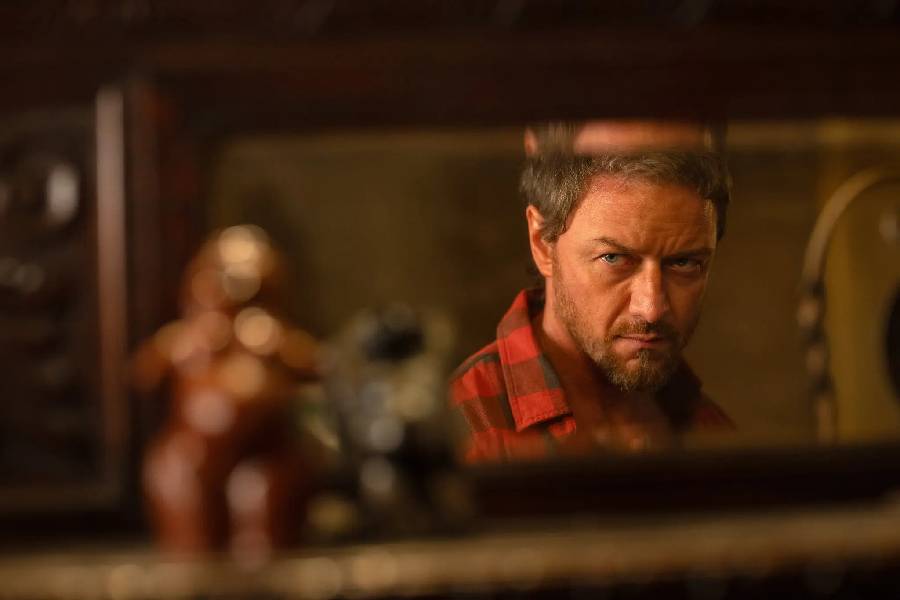4.0 out of 5.0 stars
“Speak No Evil” is a tense, slow-burn thriller that reels you in with an unrelenting accumulation of marital discord and microaggressions, never letting go until its final explosive climax.
Written and directed by James Watkins, the film is a remake of “Gaesterne,” a relatively unknown 2022 Danish indie horror movie. Bleak and dour, the characters barely fight against their steadily worsening situation, and the film ends not with a bang but a stoic, Scandinavian whimper.
“Speak No Evil” takes “Gaesterne’s” skeletal plot, packs more meat onto the characters, injects more action and dialogue into every scene and adds a more conventional third act to satisfy audiences. It’s the stereotypical Hollywood approach.
In this case, more is much, much better.
The movie opens with the Dalton family feeling somewhat listless and dejected now that their recent move from Chicago to London is not the fresh start they had expected it to be. Louise (Mackenzie Davis) has left her job in support of her husband’s pursuit of a career opportunity that is not panning out. She is emotionally exhausted from her efforts to repair her husband, Ben’s (Scoot McNairy), wounded masculinity after he caught her sexting another man. Now, Ben is angry and insecure about their relationship. Caught in the middle of this conflict is their daughter Agnes (Alix West Lefler), a clever eleven-year-old still attached to her stuffed bunny, Hoppy.
On vacation in Italy, the Daltons meet another family, Paddy (James McAvoy), Ciara (Aisling Franciosi) and their mostly silent son, Ant (Dan Hough), who has a disability that makes verbal communication difficult. The Daltons are enchanted by this new family that seems to be everything they aren’t: fun, employed, raunchy, and in love. Paddy is a man’s man, the kind of man Ben aspires to be; he flips into pools, rides Vespas, blows flaming papers into the air and talks of his family’s country lifestyle. By the end of their vacation, when Paddy invites them to visit his home, Ben is eager to go. Louise, the more logical of the two, is more hesitant because they barely know the couple.
What ensues is a slow-moving, eerie plot that uncovers Paddy and Ciara’s parental and social wrongdoings. Moments after the Daltons arrive at Paddy’s farmhouse, they are treated to Paddy’s “prized goose,” killed and cooked by his own hands. Louise, who announced she was vegetarian, is forced into having the first bite. The psychological one-upmanship escalates from there as the film shifts into a guessing game for the audience — which straw will finally break the camel’s back and convince the Daltons to leave?
McAvoy antagonistically steals the show as a manipulative liar. He is phenomenal at slowly unraveling the inner workings of his character, leading to an unpredictable and enthralling performance. According to the actor, he drew inspiration from Andrew Tate, the infamous male chauvinist who promotes the treatment of women as brainless doormats with his pseudo-intellectual dialect.
But McAvoy is not the only one with acting chops in this movie — far from it. Davis deftly matches McAvoy. Her simmering anger as Louise, sick of constantly making herself smaller so that her husband can feel like a bigger man, counterbalances McAvoy’s predatory evil. Franciosi as Ciara acts as a reliable, but ultimately false, mediator, bridging the divide between Paddy’s intensity and Louise’s uneasiness.
Most of the action takes place in the farmhouse that Paddy and Ciara call home. Numerous doors are bolted by lock and chain, peculiarly placed stained-glass windows peer into bedrooms and stairs creak at the slightest step. It’s the perfect setting for a horror film, with so many surprises hidden around every corner.
The Daltons, as a couple, are like the abused spouse, giving chance after chance to Paddy and Ciara, their tormenting partner. The audience is left to shout, or at least think: “Get out, now!” And then watch, dumbfounded, as they allow opportunity after opportunity to slip by.
“Speak No Evil” is an exercise in frustration, not tedium. It’s impossible to look away from the screen during a single second of its 110-minute runtime — time that audiences will feel was well spent. The film is further proof that the sometimes stereotypical Hollywood has been used time and time again for a reason: it works.




















